Queen is unquestionably one of the greatest rock bands of all time, elevating 1970’s and 1980’s-era rock music by appealing to mavericks and misfits with all sorts of mixed, unorthodox musical stylings. A big part of that charisma also came from singer and frontman, Freddie Mercury, a Parsi-British eccentric who has since become a very prolific gay icon, particularly after he passed away on account of complications from AIDS in 1991. Queen was all about daring, pushing boundaries and making more from the rock music genre, so a biopic about their exploits, and particularly those of Mercury, should be brash, uncompromising, challenging and even a bit uncomfortable… Right? Well, in the case of Bohemian Rhapsody, that doesn’t quite end up being true, even if a lot of the band’s unique magic still manages to shine through the extensively polished Hollywood sheen.
To the absolute credit of Bohemian Rhapsody, it’s not at all evident that this movie suffered through numerous production issues. These first arose from a false start that was originally put together with Sacha Baron Cohen, who vacated the lead role of Freddie Mercury on account of creative differences. Then, once the movie actually did get off the ground with new leading man, Rami Malek, it still suffered under the allegedly highly erratic and unprofessional direction of Bryan Singer, who was eventually fired from the project after filming had already started, before being replaced by Dexter Fletcher, with almost twenty days still left to complete in filming. It’s a massive testament to the talents of both Malek and Fletcher that Bohemian Rhapsody shines with blockbuster spectacle, providing all of the captivating charisma that a Queen biopic would logically demand, even after already losing a former director and lead star.
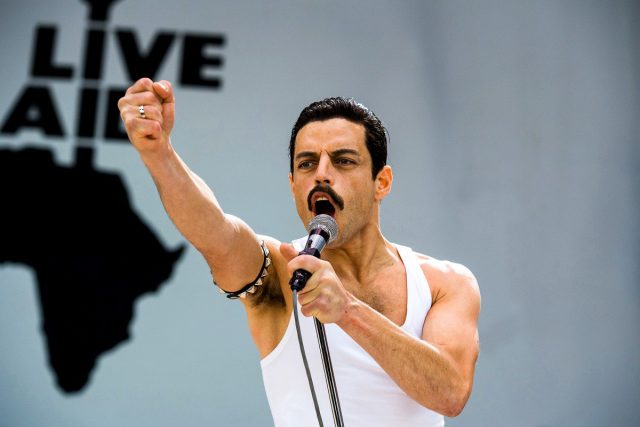
That being said however, Bohemian Rhapsody’s main draw, aside from Malek’s outstanding lead performance anyway, also often ends up becoming its greatest weakness. If there’s anything to scrutinize about Bohemian Rhapsody, it’s the fact that it’s a very sanitized portrayal of Mercury and of Queen, and one that seems primarily designed for people who are already big fans of Queen and their music. If that’s you, then you’ll have a ball with Bohemian Rhapsody, which certainly glorifies Queen as the rock gods that they certainly were back in the day, and still are for the most part. If you’re not already a Queen fan and/or a Freddie Mercury enthusiast however, then Bohemian Rhapsody won’t quite have the same effect on you, since it’s primarily concerned with preaching to the choir, rather than providing a truly insightful or challenging look at Queen, or its dazzling front man. As a celebration, Bohemian Rhapsody is great, but as an examination, it’s disappointingly average, merely providing a surface-level look at its subjects that never truly manages to challenge expectations.
Bohemian Rhapsody claims to be the story of Queen, but make no mistake, this is undeniably the story of Freddie Mercury first and foremost. There’s still plenty of looks at Queen’s ups and downs, providing a peek at how many of their greatest and most iconic songs came together, and how the relationship of the band was affected by its various pressures, but everything pretty much entirely unfolds from the late Mercury’s perspective. Brian May and Roger Taylor, Queen’s lead guitarist and drummer, respectively, manage to get a few decent scenes and dialogue bits, but poor John Deacon, the band’s bass guitarist, gets completely shoved into the background, barely having any lines compared to everyone else. There’s even one point in the movie where Mercury comically insults Deacon by claiming that he forgot who Deacon was, and it’s tough to blame Mercury here, since even the movie doesn’t give Deacon much in the way of identifiable personality. I don’t think this is accidental to boot, since both the real-life May and Taylor served as producers on Bohemian Rhapsody, whereas the real-life Deacon, who is admittedly a bit of a recluse, wasn’t really involved at all, so it’s unsurprising that this movie’s version of May and Taylor would both have far more screentime and memorable personality.
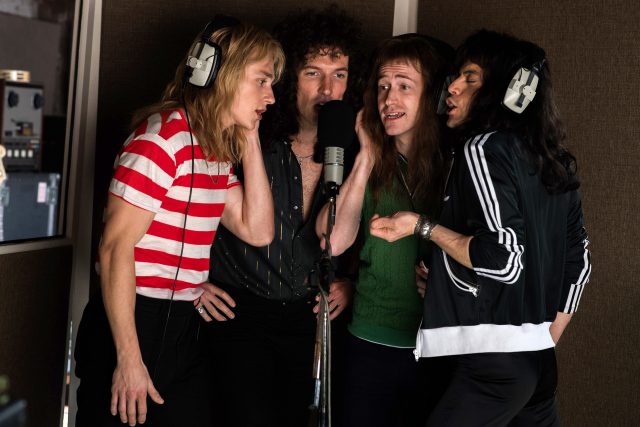
As I said however, Bohemian Rhapsody is undeniably Freddie Mercury’s show, and that’s likely appropriate, since Mercury served as the largest contributor to the band’s controversial personality. Fortunately as well, Rami Malek is truly transcendent in the lead role of Mercury, disappearing completely into the late rock icon’s likeness, to the point where it’s easy to forget that this movie’s portrayal isn’t the real Freddie Mercury! This is far and away the best performance that Malek has delivered in anything to date, which is enough to make you wish that his Mercury portrayal was presented in a movie that had more actual boldness with how it portrays Queen. Even with the glossy take on everything presented in Bohemian Rhapsody however, Malek’s performance is worth seeing this movie for by itself, even if you couldn’t care less about Queen or their legacy. It’s more than enough to earn Malek an Oscar nomation for Best Actor, and I really do hope that he gets one!
That being said however, it remains true that even Malek’s stellar portrayal of Mercury can’t totally escape the fact that Bohemian Rhapsody seems almost too reverent of Queen, and seems to be petrified of offending the band’s fans. Even more evident is that this movie seems gravely concerned with disturbing Mercury’s image as a gay icon, despite the fact that Mercury was actually bisexual, something that is very quickly swept under the rug in this biopic. I imagine that original director, Bryan Singer had a personal desire to highlight Mercury’s affairs with men, since Singer is an openly gay man, but this is still presenting a biased take on Mercury and what he represented. Even after splitting from his wife on account of his sexuality, Mercury had affairs with other women as well as men, which has been documented plenty of times. This movie’s take on Mercury being a full-on homosexual man is among its several rather distracting historical inaccuracies, and while I doubt that this will be seen as a big deal to people who admire Mercury and what he represents for the LGBT community, it is a sign that the movie is holding back with truly challenging the audience as to how Mercury has become a part of rock culture.
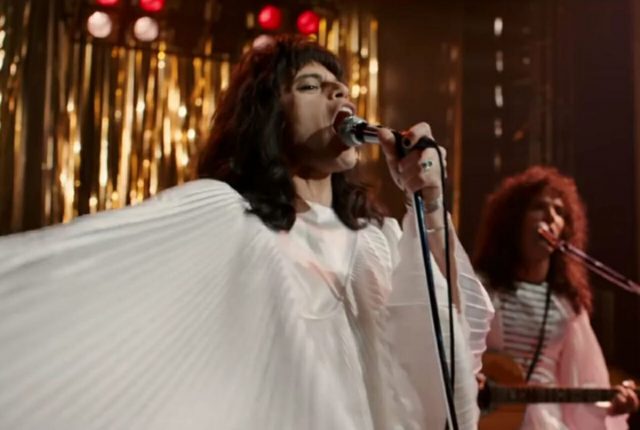
There are plenty of other personalities that show up in Bohemian Rhapsody, from Mercury’s ex-wife, Mary Austin, to the band’s various managers, lawyers and executive contacts (Mike Myers even plays a fictionalized record executive that serves as a cute nod to the famous, “Bohemian Rhapsody” sequence in Wayne’s World), to Mercury’s personal manager and frequent lover, Paul Prenter, who is more or less made the villain of the movie, essentially becoming Queen’s personal version of Yoko Ono in this case. It’s all fine, and the movie’s performers certainly do a good job (even if they’re all firmly in the shadow of Malek’s Freddie Mercury), but even these real-life personalities don’t manage to separate themselves from so many other character archetypes that are in so many other musical biopics, and musical dramas in general. Sleazy, untrustworthy manager? Check. Condescending record executive that is inevitably proven wrong? Check. Put-upon love interest? Check. Unlikely source of band-unifying wisdom? Check. It’s all here. If you’ve seen any musical biopic, you’re already familiar with most of the characters in Bohemian Rhapsody, with Malek pretty much entirely shouldered with the burden of making the movie stand out, which, thankfully, is something that he does manage to miraculously do single-handedly. This also means that any scene without Mercury will just make you want to go back to Mercury though.
Bohemian Rhapsody aims to portray fifteen years of the history behind beloved rock band, Queen (with Freddie Mercury’s history being the highest priority, like I said), spanning the band’s coming together and humble beginnings in 1970, and going up to their big Live Aid performance in 1985. This is certainly very ambitious, since Bohemian Rhapsody essentially has to squeeze fifteen years’ worth of rock music history into two hours, which definitely leads to several storytelling concessions, and more than a few re-arranged historical events. Queen’s movie tie-in work on projects like Flash Gordon are completely ignored, for example, as are most of the band members’ solo projects. The biggest re-arrangement to events however comes in the alteration of how Mercury’s fatal AIDS diagnosis is portrayed. That diagnosis was made after Live Aid in real life, but the movie makes it occur earlier in this portrayal of the story, so that it can explore the diagnosis within its designated time period, in turn creating more drama and stakes for the climax. I suppose that’s fair enough, if you can accept the historical inaccuracy.

That historical inaccuracy is something that you really have to make peace with as the movie goes on too. While most of the first two acts of Bohemian Rhapsody are fairly faithful to Queen’s actual history, beyond a few minor detail changes and re-arranged events, the third act in particular completely abandons following the band’s real-life history in any way, outside of their hit performance at Live Aid. This is partially to highlight Freddie Mercury’s AIDS diagnosis, as I said, but this also leads to an aggressively trite and cliched climax that has the band essentially splitting up, after Mercury’s behaviour becomes too much to handle. This entire series of climactic events in Bohemian Rhapsody is complete and total fiction. This never happened, period. Hell, Brian May and Roger Taylor even had to sheepishly admit that this never happened while doing press for this movie! This fictional story turn is completely concocted in order to make Bohemian Rhapsody more of a conventional Hollywood music biopic, and that completely goes against the maverick stylings that Queen is supposed to be about!
Sure, the fictionalized and re-arranged events in Bohemian Rhapsody will lift hearts and possibly even compel you to cheer along with the pandering desire to massage the tastes of Queen’s many enthusiasts, but purists of music history are going to be very frustrated that the movie has to contrive some truly ludicrous conflicts that completely fly in the face of Queen’s real-life history. It feels tantamount to ‘selling out’ in order to create a more commercial-friendly and blockbuster-friendly product in Bohemian Rhapsody, and that’s definitely not a taste that you want in your Freddie Mercury/Queen biopic! The historical inaccuracy isn’t always tough to swallow, especially if you’re not that particular about Bohemian Rhapsody perfectly sticking to the facts when it could instead give you greater insight into the humanity and controversy behind Queen… But it doesn’t ultimately do that. Bohemian Rhapsody’s account of Queen’s history is undeniably entertaining, but it also feels extensively focus-tested and sanitized, creating a partial account of what Queen represents by glorifying their stage presence, without truly exploring or justifying the dangerous and intriguing niche that they managed to carve out as envelope-pushing masters of rock.
I have to stress again that Bohemian Rhapsody could have easily ended up being a trainwreck, considering its tumultuous clashes between original director, Bryan Singer, and both lead star, Rami Malek, as well as studio, 20th Century Fox. These clashes were so bad in fact that not only did Fox ultimately fire Singer from this movie midway through filming, but they also completely terminated their deal with Singer’s production company, Bad Hat Harry Productions, despite Singer having an excellent creative history with Fox, namely by being the main creative force and most frequent directing hand behind the studio’s long-running X-Men movie franchise (the fact that the X-Men film rights will soon be returning to Marvel after the Disney-Fox merger is finalized certainly couldn’t have come at a better time there!). Losing a director halfway through filming is often a death sentence for a movie’s potential, since it usually creates a clashing vision that often results in tonal inconsistency and clumsy re-worked plotting. Miraculously however, Bohemian Rhapsody holds everything steady under replacement director, Dexter Fletcher (who is sadly uncredited, due to Directors’ Guild rules), to the point where it’s impossible to tell that Bohemian Rhapsody is the product of two different directors!
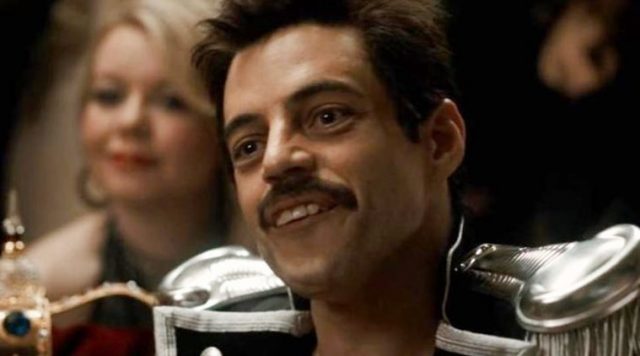
The fact that it’s extremely difficult to discern which scenes were directed by Singer and which were directed by Fletcher keeps Bohemian Rhapsody’s incredible stage magic going strong, and it’s clear that both directors are bringing a lot of passion to the legacy of Queen here. The concert sequences are of course the big highlights, being choreographed to a tee, to the point where it feels like you’re really there, watching a true Queen performance during the era, despite Rami Malek primarily lip synching during Freddie Mercury’s vocal performances. This is especially true in IMAX showings, which amp up both the scale and the deafening might of Queen’s songs, and bring all of their showcased rock concerts to incredible life!
It’s also true that Bohemian Rhapsody’s period detail is sublime, with pitch-perfect accuracy being presented with the environments, the costume design and every other element that’s meant to sell the 1970’s and 1980’s period setting. As much as the concerts are the most impressive element of the direction as well, it’s certainly true that the charisma and sheer magnetic charm of Freddie Mercury is also perfectly captured in every single instance outside of stage performances to boot, thanks to direction with just as much conviction off-stage. It’s too bad that the movie seems to be afraid of challenging Mercury’s life and legacy, since there’s definitely more emotional hurdles and struggles that could have been mined from Malek’s excellent lead performance, but even if it’s pulling punches, the quieter scenes still shine under Malek’s presence. Again, you’d never know that Malek was constantly fighting with one of the directors, because every scene that features him, both on stage and off, is realized with a very potent sense of appeal, even if Bohemian Rhapsody is not exactly taking the good with the bad as much as it thinks it is.
With Bohemian Rhapsody being a musical biopic, the soundtrack selection is definitely going to be paramount, and Queen fans definitely won’t be disappointed here! The titular song obviously gets the most focus, with several scenes dedicated to the sheer lunacy behind how, “Bohemian Rhapsody” came together as arguably the band’s most celebrated song, and how it was originally detested by music critics at the time. There are plenty of scenes that show off several other big, long-running Queen favourites that are still frequently enjoyed today too, from, “Somebody to Love”, to, “Another One Bites the Dust”, to, “Radio Ga Ga”, and of course, frequent sporting event staples, “We Will Rock You” and, “We Are the Champions.” There are other Queen songs featured as well, of course, and several of Queen’s lesser-known tunes like, “Love of My Life” and, “Fat Bottomed Girls” also make it into the soundtrack, even if it’s merely serving as background music sometimes, and not actually being performed by Queen during the story. Overall though, Queen’s songs are some of the best in the rock genre, and if you happen to enjoy that genre of music, you’ll find that just about every Queen song that’s worth a damn gets some moment or another to shine in Bohemian Rhapsody, even if the band’s all-time greatest hits clearly take story precedence.
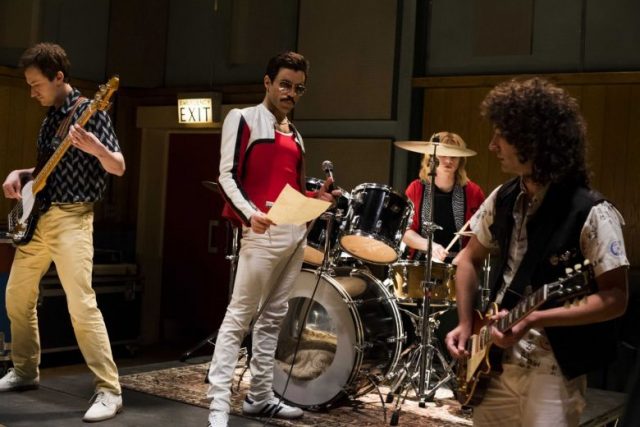
Unsurprisingly, the highlight of the soundtrack is definitely going to be the plot-crucial showcases for Queen’s top offerings, especially, “Bohemian Rhapsody”, which is not actually played in its entirety during this movie, sadly. Still, the concert sequences, and especially the Live Aid sequence, nonetheless bring forth several recreated Queen songs, all of which sound amazing and perfectly authentic. Brian May even put together a Queen-flavoured rock remix of the 20th Century Fox fanfare to kick off Bohemian Rhapsody in the opening seconds, which is pretty cool, and immediately grabs you and throws you into the production! I can’t stress enough that Bohemian Rhapsody is definitely best experienced in an IMAX theatre as well, where you can really crank up the sound and get even more power from Queen’s triumphant rock songs! Despite some of the storytelling failings, it is difficult to deny that Bohemian Rhapsody nonetheless represents one of the most amazing audio experiences that 2018’s movie selection has to offer, especially if you catch it on the big screen, and preferably the even bigger IMAX screen!
Bohemian Rhapsody is well-presented, well-performed and definitely full of personality. When taken as a crowd-pleaser, it really is a spectacular experience, and will no doubt give you an empowered swell that speaks to what the band’s music continues to mean to many Queen enthusiasts, or people who appreciate rock music in general. Once you start trying to examine the movie beyond that impressive showmanship and gloss however, that’s when it starts to come up short. Bohemian Rhapsody looks impressive, and it sounds downright divine, but it’s also going down the checklist of Hollywood-approved music biopics, and just about any emotional or narrative moment of significance could be traced back to some other high-profile music biopic that managed to be more distinct and more insightful, especially when Bohemian Rhapsody almost completely abandons historical accuracy by its third act. Further compounding this frustration with Bohemian Rhapsody’s lack of true narrative depth is the fact that it’s hitting theatres just a few weeks after Bradley Cooper’s new remake of A Star is Born, which is overall a much more deep, clever and impactful music drama, even considering that it’s an entirely fictional story in that case.
Still, I can’t fault Bohemian Rhapsody for succeeding as a crowd-pleasing blockbuster, and I did personally enjoy it quite a bit, even though I can easily concede that this year’s A Star is Born remake is definitely the superior movie, especially in terms of storytelling. Like I said, Bohemian Rhapsody feels like it’s primarily designed for people who already love Queen, and don’t need to be sold on why Queen is a great rock band. This unfortunately makes Bohemian Rhapsody more vain and shallow than it should be, with Rami Malek’s career-defining lead performance as Freddie Mercury doing most of the heavy lifting in terms of the narrative. It’s still very enjoyable in the moment, but Bohemian Rhapsody is also one of those movies that ends up feeling like a big plate of delicious icing, without an actual cake underneath it. It’ll delight you, but it won’t truly satisfy you in the long-term.

Perhaps the biggest disappointment in Bohemian Rhapsody however, one that even some hardcore Queen fans won’t be able to avoid, is that this movie ultimately plays it way too safe, and Queen is not a ‘safe’ band. Queen was all about challenging the genre, the audience and music in general, to the point where radio stations wouldn’t always play them, and TV stations wouldn’t always broadcast them, even considering their massive popularity. Bohemian Rhapsody does make several token mentions of Queen appealing to the misfits and the lost youth of society, and that’s true even today, in 2018, but the idea of celebrating maverick musicians and how they appeal to people who don’t follow the usual grain with music is literally the foundation of at least 90% of all of Hollywood’s music biopics, if not all of them! After all, Hollywood doesn’t make movies about conventional bands that do the same thing as everyone else, do they? That claim alone is not enough to separate Bohemian Rhapsody from the pack.
It’s very entertaining, and it’s extremely commendable that it managed to defy its many production problems, to the point of making them invisible in the final product, but Bohemian Rhapsody only partially manages to capture the full splendour of Queen, even if it made sure to get most of the bits that fans of the band would want to see. Still, this music biopic is ultimately all gloss and no grit, making it a polished, but disappointingly superficial production that plays to expectation, and never fully manages to make its mark among so many other movies like it.

